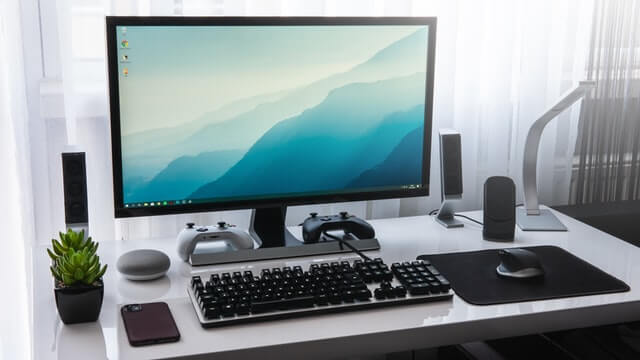In the modern era, laptops have lagged behind the desktop for most of us. A slim and compact, light laptop that folds is ideal for sitting anyplace and can be taken anywhere in the backpack. However, there are several reasons why you might choose a hefty desktop computer over a laptop. Because our computer habits and technology move so quickly, the decision is not as simple as it appears as Why Buy a Desktop Computer?
Today, we’ll go over some features that will help you make a better decision when purchasing your next personal computer or PC. This is not a complete list, but it will assist you in better understanding the differences between laptops and desktop computers and making informed choices.
Let’s get started with the primary topic of Why Buy a Desktop Computer?
Contents
Distinguishing Feature
Portability
Behind every computer is a trade-off between mobility and performance — you may observe that the larger the laptop or desktop, the more detailed the internal specs are. If you want to keep your PC and work with you at all times, a laptop is an ideal option.
A desktop computer isn’t technically a move-in, but you can carry pieces of it or the complete CPU anywhere. However, if cost is your major issue, you should go for a laptop. The desktop has a faster internet connection, a more powerful setup, and easier online cloud or drive access.
This does not need you sitting alone in the workplace after office hours have ended to accomplish your heavy responsibilities; instead, you can perform that job comfortably from home and on your desktop computer.
Power and Price
It is only logical that a PC with greater power and better setup demands the purchase of a bigger device with more internal storage. Not only should the larger pieces have additional room around them to prevent overheating, but so should the smaller ones.
When a laptop starts performing at a desktop level, it starts consuming lag and emitting a lot of noise and heat. As a result, a desktop PC is the ideal choice if your work requires maximum power and performance.
In the same price range, a desktop will lag behind any laptop in terms of specifications, including CPUs, RAM, local storage space, graphics power, expansion ports, and so on.
Parts for laptops with the same optimum performance cost substantially more since the components are much smaller and the manufacturing expenses are much higher.
Although not everyone needs a lot of powerful computers, gamers and video editors often use such sophisticated and professional computers.
Screen Size
Laptops are made to be portable, therefore everything is kept as tiny as possible. It can be noticed that when the desktop’s screen size range begins, their screen size ranges come to a halt.
Most laptops have an 11′′ to 15′′ display, however, there are laptops available with a 21-inch screen for individuals who can’t work without one. In this scenario, laptops are also fairly bulky and, of course, impossible to transport.
On the other hand, the size of a desktop monitor is usually 17 inches or more. There are also all-in-one desktop PCs in the market, with the entire CPU, sound system, and monitor being built as one device. These PCs are lovely to look at, and they save a lot of space in the surrounding area.
If you need to work side by side between two applications or two windows of the same application, or if you want to watch a great Four-Blu-ray movie at home, a good-sized desktop monitor is unquestionably superior to a small monitor laptop.
Opportunities for change

Another significant difference between a laptop and a desktop computer is the ease with which different sorts of configurations may be set up. A desktop computer has a high likelihood of combining various types of parts, such as memory, processor, motherboard, and so on. You can create a PC of your configuration from scratch – countless combinations possible!
In this situation, you must get a particular level of technical knowledge. Yet it is easier to create a laptop configuration because the scope is limited, while most parts of a lightweight laptop are non-removable.
For a space and heating problem, a laptop is very much like a compact system – every tiny space is important – so there is no chance of eliminating the stuff inside.
Additionally, updating and repairing computers for the same reason might be challenging. Most individuals may not be able to deal with configuration shortages or repair issues, but as a wise shopper, you should think about this before making a purchase decision.
Impact on Health
Finally, one of the most important things is posture. It may not be as important to many or many may not even think it is, however, experts advise that when using a computer, the screen should be at eye level or i-level.
This is not possible when using a laptop, most people sit and use their laptop and their neck and back abnormally.
We’re not arguing that you can’t sit in a healthy position by raising your laptop with anything.
However, for small laptops, sitting in this position may cause discomfort or agony in the hands. On the other hand, when using a desktop computer, the body can sit upright, as it consists of monitors and input devices, such as keyboards, mice, etc., and may be positioned in any way.
So if you are confused about the decision to buy a desktop, then this important fact will help you make your decision.
Other compelling reasons exist to utilize a desktop computer. Each component may be updated independently, making it less expensive than a laptop.
Whenever you think about updating your laptop, either buy a lot of things at once or buy a brand new laptop, which is like a big push on your pocket.
Because the majority of the components of a laptop are intimately linked to each other, changing one part requires changing the other part. However, in most situations, there may be only a little issue with the CPU or the need to upgrade the RAM, and even if the rest of the components are in fine working order, they must spend more money and change.
If you have little technical knowledge of a desktop, you can easily switch to an old or inconspicuous processor (and /or motherboard) laptop that costs less money. Although upgrading to an all-in-one desktop such as the iMac itself is a bit tricky.
Desktops and laptops with the same specifications are occasionally equivalent, depending completely on the brand. The main difference between the two specifications is the processor and graphics.
Laptops use a small and portable version of any processor that is not as powerful as a full-size desktop processor. It is very important to keep this in mind for those who need high-powered PCs.
Desktop is Best for Hardcore Gamers

Gaming laptops are quite attractive and great, but most of them are not as carryable as they are much heavier and larger. The good news is that these laptops cannot compete with a full-size gaming desktop.
There is nothing more than a desktop equivalent for gamers who prefer performance above price.
And the same configuration on a gaming desktop is much less expensive than on a gaming laptop. A laptop may be utilized even if you have a desktop computer, and it is not too expensive!
If you have a good desktop as your main workstation, you can buy a cheap laptop or tablet PC if you want a light or portable job. As a result, you can purchase a desktop computer.
Conclusion – Why Buy a Desktop Computer?
So, if you’re in the process of buying a new computer for your home or office, keep these points in mind. Find reviews of your favorite model online and browse through various online marketplaces like Amazon to understand the price difference and get everything at a reasonable price. All types of desktops, laptops, and tablet PCs on the market are available at reasonable rates and great discounts.




